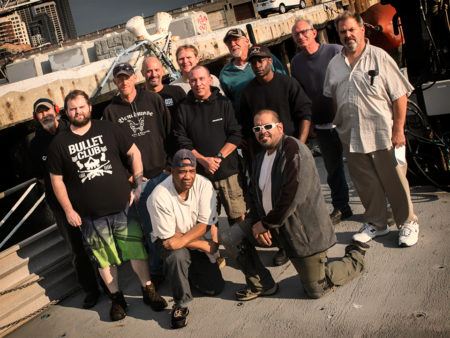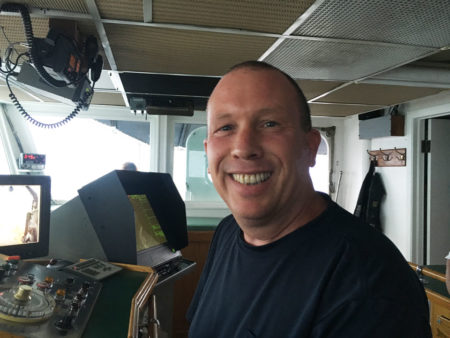
The crew of the Oceanus (Photo: Kelly J. Owen)
To get data from the ocean, it takes a village. That village includes a highly trained support crew on the ship to make sure the science team members can perform their research without undue risk to life or limb.
The Oceanus crew members come to the ship from a variety of backgrounds. Many have worked with the Navy or on fishing vessels and tug boats. There is easily more than a hundred years of experience among its crew members.
One common thread is that these are people who shun the nine-to-five office hours in favor of a life at sea. Several crew members noted that work on a research vessel offers steadier employment than work in the fishing, oil or cargo industries. An additional draw is the science that happens on board.
“It’s not like any other job on the water,” said Captain Jeff Crews. “It’s much more mentally stimulating than hauling cargo. Every couple of weeks we have a new research team coming on board studying something different in a different place using different techniques. I’m constantly learning, and that’s what keeps me here.”
That said, working on a research vessel also comes with personal sacrifices. The crew members are out at sea for months at a time, hosting one team of researchers after another. We pulled into San Francisco Tuesday morning and had to quickly offload our gear so the crew could prepare the ship for the next team of scientists arriving Wednesday. Some research teams board with prior experience on ships, while others come green.
Rarely is there more than a few days in between research voyages during the primary research months of March through November. In the winter months, the Oceanus is docked at Newport, Oregon, and the crew members switch to a daytime work schedule doing maintenance and any necessary repairs or upgrades to the ship that cannot be done while researchers are on board.
Every two years, the vessel goes through an intense, two-day inspection by the National Science Foundation that includes drills and reviews of safety and science equipment, and overall readiness for operations.
When I asked Chief Mate Jim Moore about being away from family for such long stretches of time, he joked, “What’s that saying? Absence makes the heart grow fonder?”
Moore has three sons, a 3-year-old and two older sons, ages 18 and 20. He said that this life may be more difficult for young families.
“That’s a really tough one,” said Moore, who switched from a career in music – he plays cello, bass guitar and guitar – to one on boats in his early 20s. “It’s easier in the beginning when you’re young and single. With a family, it’s hard. I’ve missed many birthdays and soccer games. At the same time, when I’m home, I’m home around the clock. We get a month or more off at a time. How many fathers can say that?”
He has witnessed firsthand how ocean research and work on the boat can often be tedious, and sometimes grinding. He quickly abandoned his romanticized vision of ocean science, the ones fed by childhood memories of Jacques Cousteau television documentaries.
“That was a big eye-opener, seeing how hands-on and dirty the job was,” said Moore.
Overcoming the long hours and time away from home is the irresistible draw of the sea. Whale and dolphin sightings may be common, but they do not get old. And the crew gets to travel to regions of awe-inspiring beauty.
It was notable how generous the crew members were with their time. They showed us how to tie bowlines behind our backs, used a drone to get some aerial footage of the boat, gave guitar lessons, showed us family photos, alerted us to whale and dolphin sightings, patiently explained how the ship operates and laughed along with us – perhaps at us – as we developed our sea legs.
“The chemistry between the crew and the scientists on this expedition was excellent,” said Jim Bishop. “It was a pleasure to be at sea again on the Oceanus. It’s a great ship.”
Bishop and his research team would like to thank the captain and crew of the Oceanus for their support. It has been a great journey.
Be sure to return to this site soon for more photos — and videos — from the research effort.

